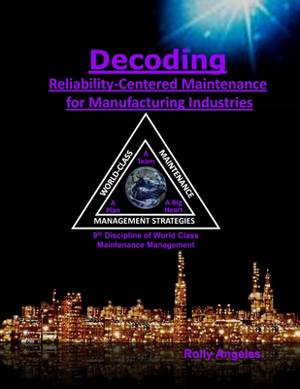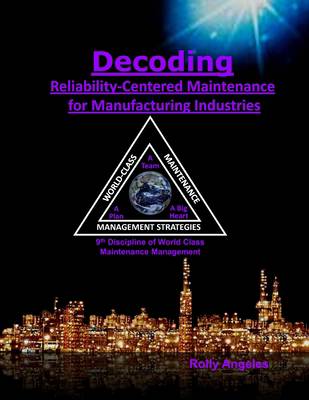
- Retrait gratuit dans votre magasin Club
- 7.000.000 titres dans notre catalogue
- Payer en toute sécurité
- Toujours un magasin près de chez vous
- Retrait gratuit dans votre magasin Club
- 7.000.0000 titres dans notre catalogue
- Payer en toute sécurité
- Toujours un magasin près de chez vous
Decoding Reliability-Centered Maintenance Process for Manufacturing Industries
9th Discipline of World Class Maintenance Management - The 12 Disciplines
Rolly AngelesDescription
Although RCM is a popular maintenance strategy, many manufacturing industries are still not implementing this process and continue to remain stuck in their current PM tasks tasks. The main reason why I wrote this book is that doing RCM in a manufacturing plant is a bit different from doing RCM in an oil and gas, power plants, and other similar plants because their equipment losses are different. There are many cases when breakdowns and failures are not the primary cause of equipment downtime. Although the process of how RCM is done will be the same. If you worked in a semiconductor plant, breakdowns and failures are not the main problemss on the machines, but minor stoppages, changeover, and quality problems are. What is important for is to know thy boundaries between what RCM can address and what it cannot.
RCM will address failures and breakdowns by proposing maintenance tasks. It is not designed to address every possible equipment losses. What I am saying is that failures are just a subset of the entire equipment losses. Suppose you have chronic quality problems caused by the equipment, RCM can address some of them, but not all, since Quality problems and defects are much broader than breakdowns and failures. I have a detailed explanation of what particular losses RCM can and cannot address in Chapter 3.3.2 of this book. This book is written to help provide detailed guidelines in implementing RCM for manufacturing industries on their machines, equipment, and assets.
Some of the highlights of this book include:
- 27 Frequently Asked Questions (FAQ) on RCM
- 22 Tips on Implementing RCM- 15 Don'ts About RCM
- Why the RCM Preparatory Stage is Important
- Detailed Guidelines in Doing the RCM Preparatory Step
- Can RCM Address All Equipment Losses?
- Actual Case Study on RCM: Air Handling Unit Case
- Role of Operators in the RCM Analysis
- How to Integrate RCM into the TPM Process
- Bonus: RCM Forms in Excel Format
- The RCM and TPM Crossroads - Do they have different or the same paths
- Strengthening the SAE JA1011 Criteria
- Addressing MRO Spare Parts after Implementing RCM
- How to Determine the Correct Interval for PM, PdM, FFT, and Switching Standby Components
- MRO Decision Diagram on Whether to Stock or Not to Stock
- Difference Between a Failure Mode and a Root Cause
- Secondary Tasks for Doing On-Condition Tasks
- Detailed Guidelines in Writing the RCM Decision Worksheet Explained
- Detailed Guidelines in Writing the RCM Information Worksheet Explained
- Detailed Guidelines in performing Horizontal Replication for Similar Equipment with similar Operating Context
- Detailed Guidelines in Conducting the RCM Audit and many more . . .
RCM can be explain two folds, on the equipment side and on the human side. From an equipment perspective, Reliability-Centered Maintenance is a process used to determine any physical asset's maintenance tasks, decisions, and requirements in its current or present operating context. It is also a process used to determine what must be done to ensure that any physical assets continue to do whatever their users want them to do in their present operating context. From the human perspective, RCM is a way or process of capturing and extracting the knowledge, experience, and wisdom of the most experienced people in the plant and transforming it into a living document and their legacy.
Spécifications
Parties prenantes
- Auteur(s) :
- Editeur:
Contenu
- Nombre de pages :
- 426
- Langue:
- Anglais
- Collection :
- Tome:
- n° 7
Caractéristiques
- EAN:
- 9798718105797
- Date de parution :
- 07-03-21
- Format:
- Livre broché
- Format numérique:
- Trade paperback (VS)
- Dimensions :
- 216 mm x 279 mm
- Poids :
- 979 g

Les avis
Nous publions uniquement les avis qui respectent les conditions requises. Consultez nos conditions pour les avis.






